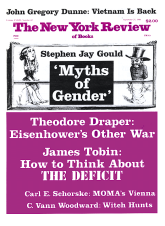In response to:
Waiting for Mandela from the May 8, 1986 issue
To the Editors:
In his otherwise generous review of my Dispensations: The Future of South Africa as South Africans See It [NYR, May 8], J.M. Coetzee makes several claims requiring response. Of course he is right to note that people change their minds and modify their positions. Therefore what people said to me a year or more ago is not necessarily what they would say today. There is an inescapable time lag between research, writing, and the final appearance of a book. This is a problem to be kept in mind in reading any book about a situation as fast-changing as that of South Africa, as I explicitly note in the introduction. As with all books on current affairs, this one should be read together with a newspaper and other reports of more immediate developments. Having just returned from another visit to South Africa in mid-April, however, I am confirmed in my judgment that Dispensations offers a reliable guide to the several parties, interests and arguments in contention there. One of the many sadnesses of South Africa is that the basic shape of the conflicts has not changed in recent years and may quite possibly not change in the years immediately ahead.
Mr. Coetzee correctly says that the government is by no means in firm control of events and is in no position to design and impose a political settlement. I repeatedly say that in Dispensations and am surprised that Mr. Coetzee thinks we disagree on this critical point.
Mr. Coetzee makes two additional statements which are seemingly minor but should be corrected for the record. He infers that I have a “distinct dislike” of Allan Boesak because I say that Boesak’s voice tends to squeak when he becomes publicly impassioned. Really. Whether or not one agrees with his politics, I fully share the view that Allan Boesak is personable and indeed charming. It would be hard to dislike him personally and I have no reason to make the effort.
Mr. Coetzee also suggests that I rely too much on the word of Denis Worrall, who, as he says, is now South African ambassador in London. He doubts that Worrall is “privy to the government’s innermost councils.” Perhaps he is right, but I would point out that, at the time of the conversation in question, Worrall was the key actor in the government’s committee writing a new constitution for South Africa. I think it reasonable to believe that he was, and maybe still is, as close to inside thinking about what the government calls the “new dispensation” as almost anybody around. In any event, the importance I ascribe in the book to Samuel Huntington’s analysis of political change in South Africa is hardly dependent upon Mr. Worrall’s saying that it is so important. In the judgment of numerous political actors in South Africa, and in my own judgment, Huntington’s analysis is an unavoidable point of reference in continuing debates about the possible futures of that country.
Richard John Neuhaus
New York, New York
This Issue
September 25, 1986



